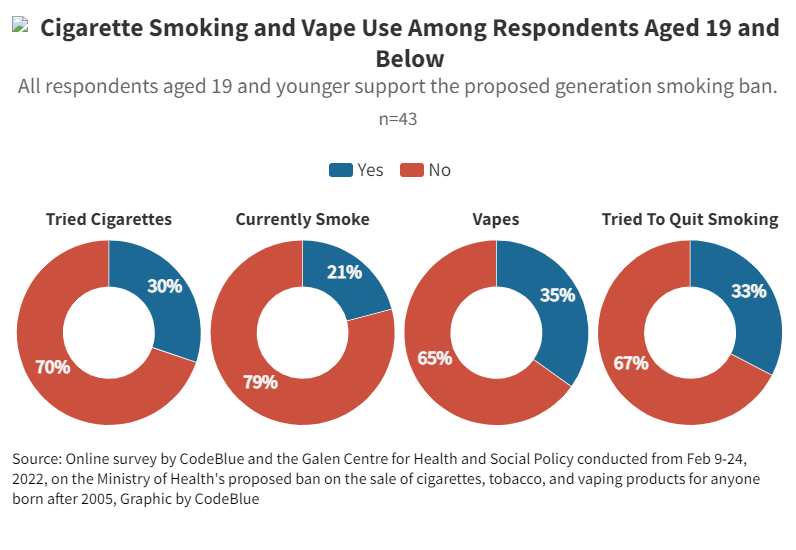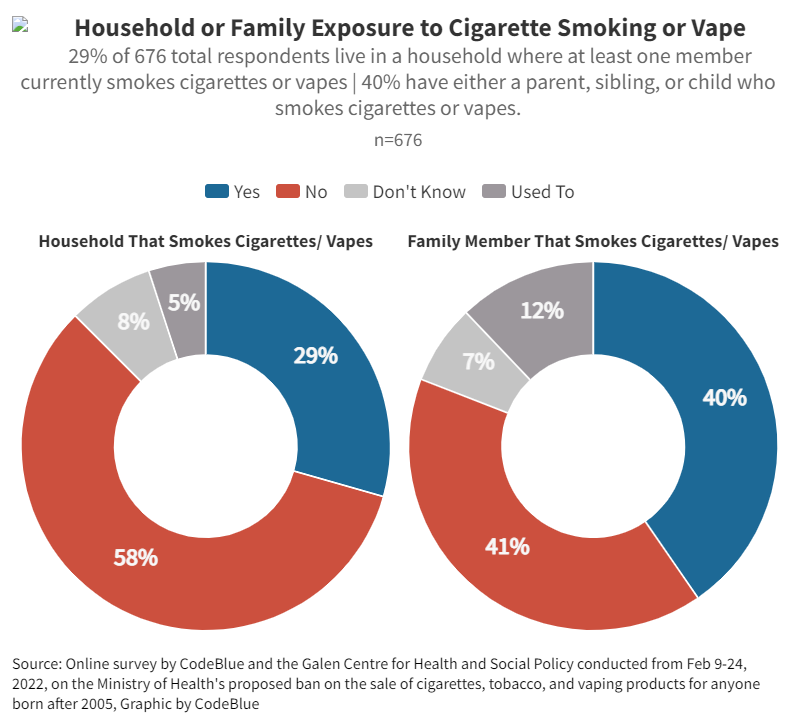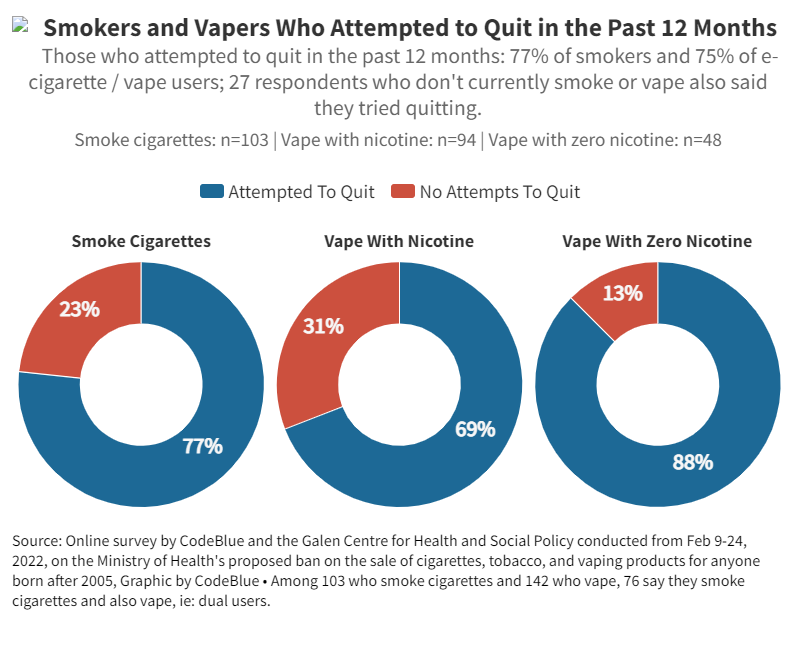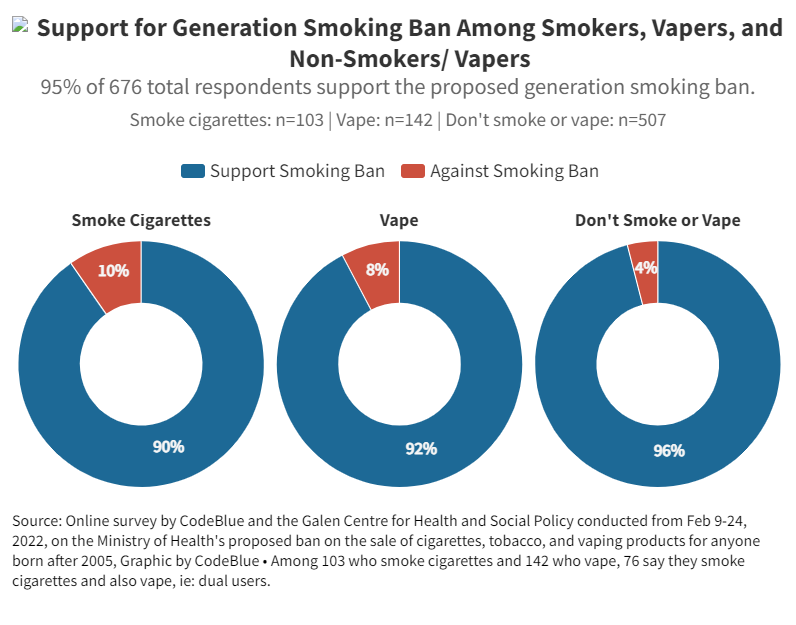KUALA LUMPUR, Feb 25 – A survey by CodeBlue and the Galen Centre for Health and Social Policy shows 95 per cent of 676 respondents support the government’s proposed generation smoking ban, including smokers.
Out of the 676 total responses gathered from the two-week online poll, which ran from February 9 until February 24, a total of 103 respondents, or 15.2 per cent, are current cigarette smokers, while 142 respondents (21 per cent) currently use e-cigarettes or vape. Among 103 who smoke cigarettes and 142 who vape, 76 say they smoke cigarettes and also vape, making them dual users.
Those who smoke or vape, or engage in both, comprise 25 per cent (169 respondents) of the sample.
Among the 103 respondents who currently smoke cigarettes, 93 respondents (90.3 per cent) said they were supportive of the cohort smoking ban, with many saying it would be more difficult to quit smoking than to avoid it in the first place.
Other cigarette smokers who supported the proposed smoking ban policy said they do not want their children or grandchildren to smoke and that smoking had no positive effects on health.
Among the survey’s 142 respondents who use e-cigarettes or vape, 131 respondents (92.3 per cent) were supportive of the cohort smoking ban.
Between those who use vape with nicotine (94 respondents) and those who vape with zero nicotine (48 respondents), the survey found the latter to be fully supportive of the proposed smoke-free law, compared to 88 per cent among those who use vape with nicotine.
Their primary reason for supporting the legislation is similar to cigarette smokers who are supportive of the ban: that early prevention is much easier than having to deal with the struggle of cutting oneself from the habit.
Among 507 respondents who don’t smoke or vape, 96 per cent (487 people) also support the government’s proposed measures to outlaw smoking and vaping for the next generation.
Health Minister Khairy Jamaluddin, earlier in January, announced Malaysia’s plans to prohibit the sale of cigarettes and tobacco products to people born after 2005 in a bid to outlaw smoking for the next generation, following a similar move made by New Zealand.
This means that Malaysians who are 17-years-old today would not be able to legally buy tobacco next year when they turn 18, the current legal age for smoking in Malaysia, or ever, in their lifetime. Neither will subsequent generations be ever permitted to purchase cigarettes and other tobacco products.
The cohort smoking ban not only covers cigarettes and tobacco products, but also vape, e-cigarettes, and heated tobacco products.
Full Backing From Generation Z

Interestingly, the survey also found that all 43 respondents aged 19 and below supported the smoking ban, with most citing the same main reasons favouring the ban. Many also think that existing laws against smoking are not enough to outlaw the habit.
One respondent said: “[Smoking] harms the smoker and the people around them, especially when they are in public, like at restaurants.”
Another respondent said: “In Buddhism, it is against the precepts.”
Among the 43 under-20 respondents, 13 respondents (30.2 per cent) said they have tried cigarette smoking in the past 12 months, nine respondents (20.9 per cent) are currently smoking cigarettes, and 15 respondents (34.9 per cent) use e-cigarettes or vape.
One respondent (2.3 per cent) also uses smokeless tobacco products like chewing tobacco, while six respondents (14 per cent) use other tobacco products such as waterpipe or shisha, kreteks, or electronic heated tobacco or heat-not-burn products.
Fourteen respondents (32.6 per cent) aged 19 and below said they tried to quit smoking in the past 12 months.
Why 5% Oppose Generation Smoking Ban
Overall, the vast majority (641 respondents or 94.8 per cent) of the survey’s respondents supported the generation smoking ban.
Of the 35 respondents (5.2 per cent) who did not support the smoking ban policy, many are sceptical about enforcement mechanisms, given the government’s poor track record with its no-smoking policy in restaurants.
Others liken the generation smoking ban as a slippery slope as the government may later impose bans on other products such as alcoholic beverages. The government should instead consider other alternatives rather than an outright ban, they said.
One respondent said: “It’s a form of totalitarian dictatorship policy.”
Several other respondents raised concerns about the proliferation of illicit cigarettes in the country should the legislation come into force. “If the war on drugs still continues to this day, the war on smoking will also never end,” one respondent said.
Another respondent asked: “How are they (the government) going to track the buyer’s age?”
Khairy previously said there were “many methods” to ensure that the generation smoking ban, should Parliament approve the legislation, can be enforced effectively.
Galen chief executive Azrul Mohd Khalib suggested using QR codes on the government MySejahtera app to operationalise the proposed generational smoking ban.
Azrul said a QR code could easily be generated through the Covid-19 mobile app — which currently has at least 27 million registered users — allowing retailers to scan and quickly verify that the bearer is legally permitted to purchase tobacco products.
Others presented the possible scenario of older people buying cigarettes, vape, or other tobacco products for those born after 2005. “Oldies will end up buying for youngsters,” one respondent from the survey said.

The poll found that 199 respondents (29.4 per cent) live in a household where at least one member is currently smoking cigarettes or vape.
Another 33 respondents (5 per cent) said they live in a household where at least one member has a history of smoking or using vape, while 51 respondents (7.5 per cent) said they were unaware if anyone in their household smoked or vaped.
In terms of exposure to cigarette smoking or vape from immediate family members – namely, parents, siblings, or children – 273 respondents (40.4 per cent) said they had either a parent, sibling, or a child who currently smokes cigarettes or vape.
Eighty-two respondents (12.1 per cent) said they have a family member who used to smoke cigarettes or vape, while 47 respondents (7 per cent) said they don’t know.
How The Government Can Encourage Smokers To Quit

A total of 152 respondents said they attempted to quit smoking in the past 12 months, including 27 who don’t currently smoke or vape.
Nineteen others tried to quit smoking more than 12 months ago, bringing the total to 171 respondents with some experience of attempting to quit smoking.
Of the 171 respondents, 82 respondents or 48 per cent that make up the majority, went cold turkey on their own.
Fifty-six respondents (32.8 per cent) said they joined a quit-smoking programme or got help from a professional, while 33 respondents (19.3 per cent) have opted to use smoking cessation products such as the nicotine gum and patch.
Among 103 respondents who currently smoke cigarettes, 79 respondents (76.7 per cent) tried to quit smoking within the past year. Among 142 respondents who use e-cigarettes or vape, more than 75 per cent (107 respondents) attempted to quit.
The top-most response on how the government can encourage smokers to quit is making nicotine replacement therapy (NRT) products easily accessible to the public at 82 per cent. NRT products like the nicotine patch or gum are only available on prescription, instead of over-the-counter.
Providing incentives to companies for smokers to quit smoking came in second with a vote of 79.5 per cent, followed by creating more awareness programmes with 78.6 per cent of votes.
About 67 per cent of respondents voted for their Employees Provident Fund (EPF) Account 2 to be made available for withdrawal for smoking cessation treatment, while 59.3 per cent said the government could provide income tax relief for smoking cessation therapies.
The survey’s 676 respondents involved 354 males (52.4 per cent), 310 females (45.9 per cent), and 12 transgenders (1.8 per cent).
By ethnicity, 400 respondents (59.2 per cent) were Malay, 154 (22.8 per cent) were Chinese, 52 Indian (7.7 per cent), 34 Bumiputera Sabah (5 per cent), 21 Bumiputera Sarawak (3.1 per cent), 5 foreign nationals (0.7 per cent), and 10 others (1.5 per cent).
By age, 255 respondents (37.7 per cent) were in the 30-39 age group, 194 respondents (28.7 per cent) aged 20-29 years, 98 respondents (14.5 per cent) aged 40-49 years, 50 respondents aged 50-59 years (7.4 per cent), 43 respondents aged 19 and below (6.4 per cent), and 36 respondents (5.3 per cent) aged 60 years and older.
Correction: The text in the last graphic on quit attempts was corrected. It initially stated that 90 per cent of 169 smokers, vapers, and dual users attempted to quit smoking in the past 12 months. The 152 respondents who said they attempted to quit smoking includes 27 people who don’t currently smoke or vape. The sentence in the article below that graphic has also been corrected.








